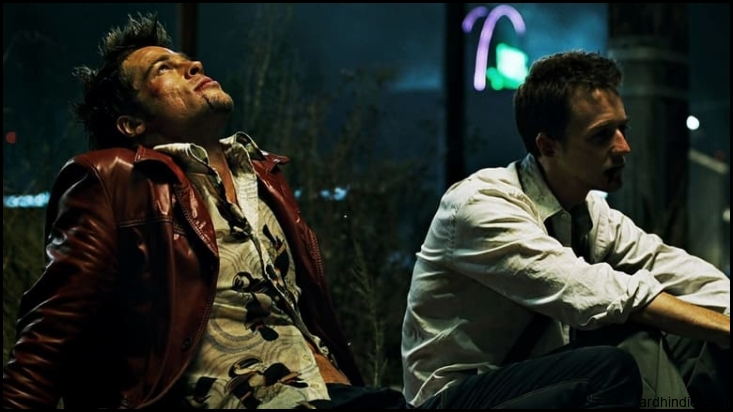Fight Club 1999 Full Movie Review
Movie Review: Fight Club 1999
Rating: ★★★★★ (5/5)
Fight Club, directed by David Fincher, is a riveting cinematic gem that challenges societal norms and delves into the darkest depths of the human psyche. This film has left an indelible mark on cinema history and continues to captivate audiences with its thought-provoking themes, stellar performances, and impeccable craftsmanship.
At its core, Fight Club tells the story of an insomniac office worker who forms an underground fight club as a means to escape his mundane existence. As the plot unravels, it seamlessly weaves in elements of consumerism, masculinity, identity crises, and rebellion against conformity. It’s impossible not to be drawn into this intense exploration of existential angst.
The acting in Fight Club is nothing short of phenomenal. Brad Pitt delivers a tour de force performance as Tyler Durden, exuding charisma and unpredictability with every line uttered. Edward Norton complements Pitt impeccably as the tormented protagonist suffering from a dissociative disorder. Their chemistry is electrifying and adds depth to their complex characters.
David Fincher’s visionary direction elevates this film beyond typical Hollywood fare. His meticulous attention to detail serves both the visceral fight scenes and intricate plot twists flawlessly. Fincher creates an atmosphere drenched in gritty realism while sprinkling subtle visual cues throughout the movie that reward attentive viewers upon subsequent viewings.
The score by The Dust Brothers perfectly complements Fight Club’s anarchic spirit by blending electronic beats with raw guitar riffs that heighten tension during pivotal moments. From Pixies’ “Where Is My Mind?” playing over the film’s climactic scene to The Dust Brothers’ haunting tracks echoing themes of chaos and self-destruction, every musical choice resonates powerfully within each scene.
Cinematographer Jeff Cronenweth masterfully captures gloomy industrial settings juxtaposed against the characters’ inner turmoil. The use of low-lighting and visually striking compositions creates an atmosphere that mirrors the characters’ psychological descent.
Production design in Fight Club is utterly immersive, showcasing a stark contrast between the sterile corporate world and the grungy underground fight club. The sets are meticulously designed to enhance the film’s themes, displaying a keen eye for detail that reinforces its underlying messages.
Special effects are used sparingly but effectively in Fight Club, adding a layer of surrealism to certain scenes without overshadowing the story’s emotional depth. Fincher’s decision to blend practical effects with minimal CGI ensures that these moments have maximum impact while maintaining an authentic feel.
Editing plays a key role in Fight Club, allowing for seamless transitions between reality and fantasy. Quick cuts and innovative visual techniques heighten suspense, reinforcing the film’s sense of disorientation and building towards its explosive climax.
The dialogue in Fight Club is sharp, poignant, and expertly crafted. Fincher brilliantly balances dark humor with philosophical musings, leaving audiences both entertained and deeply reflective about their own lives long after leaving the theater.
Fight Club is not without its criticisms; some argue that its themes may be misinterpreted or glorified by certain viewers. However, it cannot be denied that this film leaves an indelible impact on those open to its unconventional narrative structure and unflinching examination of societal norms.
In conclusion, Fight Club stands as one of cinema’s most influential works due to its daring exploration of identity crisis and disillusionment within modern society. With brilliant performances, visionary direction, captivating cinematography, immersive production design – topped off by a thought-provoking script – this movie transcends traditional genres to become an unforgettable experience that will leave you questioning your own existence long after the credits roll.

Release : 1999-10-15
Genre : Drama, Thriller, Comedy
Runtime : 139
Home Page : http://www.foxmovies.com/movies/fight-club
Company : Regency Enterprises, Fox 2000 Pictures, Taurus Film
Cast : Edward Norton as The Narrator, Brad Pitt as Tyler Durden, Helena Bonham Carter as Marla Singer, Meat Loaf as Robert “Bob” Paulson, Jared Leto as Angel Face






